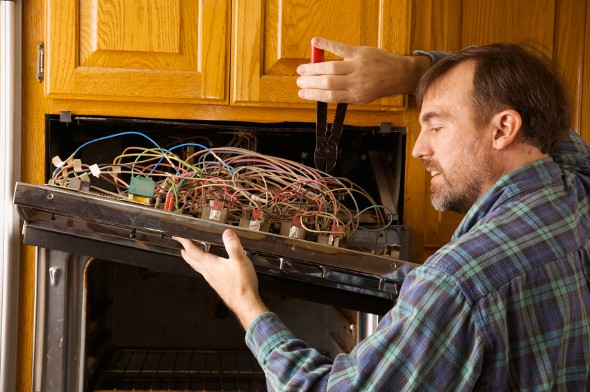Is buying a home in your plans for the future? If that’s the case, you might already be thinking about all of the expenses you’ll have to pay for. You might be tempted to cut corners and avoid paying for a home warranty plan. But then again, when you buy your dream home you probably won’t want your excitement to be cut short by a broken heater.
Find out now: How much house can I afford?
Home Warranty Insurance: The Basics
Not to be confused with homeowners insurance, a home warranty is a year-long service contract that protects various systems in your home if they fall apart over time from regular use.
If a brutal hailstorm destroys part of your roof, your homeowners insurance could cover the damage since it’s designed to protect the structure and foundation of your home, as well as the items you have within it, from theft and other dangers. It’s possible to use homeowners insurance to take care of yourself and members of your family too if injuries occur as a result of a fire or some other emergency.
If part of the roof falls inside your home and ruins one of your ceiling fans, you could get a new fan relatively quickly if you’ve got a home warranty plan. Is a home warranty worth it? Ultimately, the answer depends on your risk tolerance.
How a Home Warranty Works

Having a home warranty can be a convenient way to replace damaged or worn appliances in your home, especially if you don’t have enough money to purchase something big, like a brand new oven.
Through a warranty, you’ll be able to connect with a worker from a business that has a contract in place with your home warranty company. From there, your service provider will be able to assess the problem and determine whether an appliance needs to be fixed or replaced.
Who wants to spend time finding someone to resolve an issue with your furnace when your warranty company can easily hook you up with a professional who can do the job for a small fee?
Related Article: 4 Tips for Purchasing a Homeowners Insurance Policy
Home Warranty Plans
Home warranty coverage often differs from one company to the next, so it’s a good idea to read your contract thoroughly so that you’re aware of what’s covered and what’s not. A typical plan will fix or replace electrical systems, microwaves, dishwashers, air conditioning units, garbage disposals, plumbing systems, telephone wires, vents, pipes and doorbells.
Unless it’s included in your contract, you might not have coverage for the swimming pool in your backyard, your broken garage door or your old sprinklers, refrigerator, washer or dryer. With permission, however, you may be able to add some of these extras to your plan.
You can expect to pay anywhere from $250 to $500 for a home warranty, depending on the type of plan you want and the kind of home you live in. Every year that you have your warranty, you’ll be required to pay that premium plus a trade service fee that’s under $100 for house calls made to work on systems in need of repair. So, whether a home warranty is worth it to you will depend in part on your budget.
Newly constructed homes often come with their own home warranty programs. The plans are usually free for these homebuyers because their costs are rolled into the home’s sale price. Problems with portions of your home’s structure will be taken care of for roughly 10 years, while appliances and other systems could be covered for six months to a couple of years.
Related Article: Should First-Time Homebuyers Build Their New Homes?
Do I Need a Home Warranty?
Are home warranties worth it? A home warranty could be a great investment if you’re too busy to find a service provider. And, depending on what goes wrong with your home, getting a warranty can be cheaper than having to shell out a ton of money for your own repairs.
But you might want to be prepared for some of the downsides to buying a home warranty plan. For one, there’s no guarantee that the worker who comes to your house will provide quality service. You aren’t in total control of which service providers you use.
A contractor might think you should foot the bill for your old dishwasher because you didn’t take good care of it from the start. In this situation, you’d owe a fee for the visit and you’d have to pay for the damages out of your own pocket. If you don’t agree with that conclusion, however, you could take the issue up with your real estate agent.
And what happens if you’re not a fan of the brand your service provider chooses for your new microwave? By avoiding a warranty altogether, you probably won’t come across any of these dilemmas. If you like a high degree of control, you might decide that a home warrant is not worth it to you.
The Bottom Line

New houses can be expensive. And if you’ve already had to dip into your savings to cover your down payment and your other costs, a home warranty might be something you want to skip out on.
It could be worth it, however, if you don’t want to be bothered with plumbing or electrical complications within a year of your move-in date. Or maybe you’re planning to sell your home at some point and you don’t want future buyers to complain about rusty pipes and faulty wiring.
Before settling on a plan, it’s wise to read home warranty reviews and to fully understand what you’ll be getting for your money. Then you can add the warranty to your list of housing expenses. If you have a good relationship with your real estate agent, he or she may be willing to buy it for you as a gift. Or if you’re fortunate enough, your seller might agree to handle it.
Photo credit: ©iStock.com/MachineHeadz, ©iStock.com/pastorscott, ©iStock.com/biffspandex
